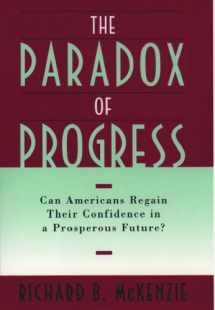
The Paradox of Progress: Can Americans Regain Their Confidence in a Prosperous Future?
Book details
Summary
Description
Things have never been better--and tomorrow they'll be better still. So argues Richard B. McKenzie in this provocative new book, The Paradox of Progress. Despite all the press stories of lay-offs and stagnant wages, despite all the talk of economic insecurity, says McKenzie, Americans have never lived so well, or had so many opportunities. The question, he writes, is not why things aren't better, but why does everyone keep complaining.
In The Paradox of Progress, McKenzie demolishes the idea that the nation is in economic decline--and explains why we still feel so insecure. Writing with tremendous passion and insight, he marshals an array of data to show that the American standard of living has never been higher in real terms. Our perception of decline, he argues, comes from the press, which has long since learned that bad news sells; but he demonstrates how the 1980s--much-maligned by the media--in fact heralded a new age of prosperity and opportunity. The corporate downsizing of recent years signals the change: the old monolithic firms of the past are adjusting to an era of smaller companies, mobile capital, and new entrepreneurship. A new economic frontier is opening up--the "New West," as he calls it--as the rapid growth of electronic technology creates fresh room for growth and creativity. Government needs to get out of the way and accept the shift in "economic tectonics." And the message for workers, McKenzie writes, is clear: "Become more productive. Work harder and smarter. Get more education and skills. Get competitive. Do more than others have been doing or will likely do. Stop complaining."
Public anxiety is justified, McKenzie adds, but it is misplaced: for if the shift in "economic tectonics" is ultimately a positive development, it has been accompanied by a "moral tectonics" earthquake that has been highly destructive. McKenzie attacks this moral earthquake head on, passionately echoing the words of Nobel Laureate F. A. Hayek, arguing that it is essential that we follow rules of social conduct, even if we don't like them or can't explain them rationally. Sweeping changes in the economy, and wrong-headed government programs, have undermined personal responsibility. The real social divide, he writes, is not between haves and have-nots, but between those who play by the rules, and those who refuse to. Members of the first group will eventually get ahead; those of the latter won't, and will blame everything--and everyone--except themselves.
Writing with tremendous wit, personality, and force of mind, Richard McKenzie offers a provocative and deeply optimistic book. In it, he presents a bold vision of a new era in which Americans can and will compete and win, if they simply seize the opportunities that await them.


We would LOVE it if you could help us and other readers by reviewing the book
Book review



